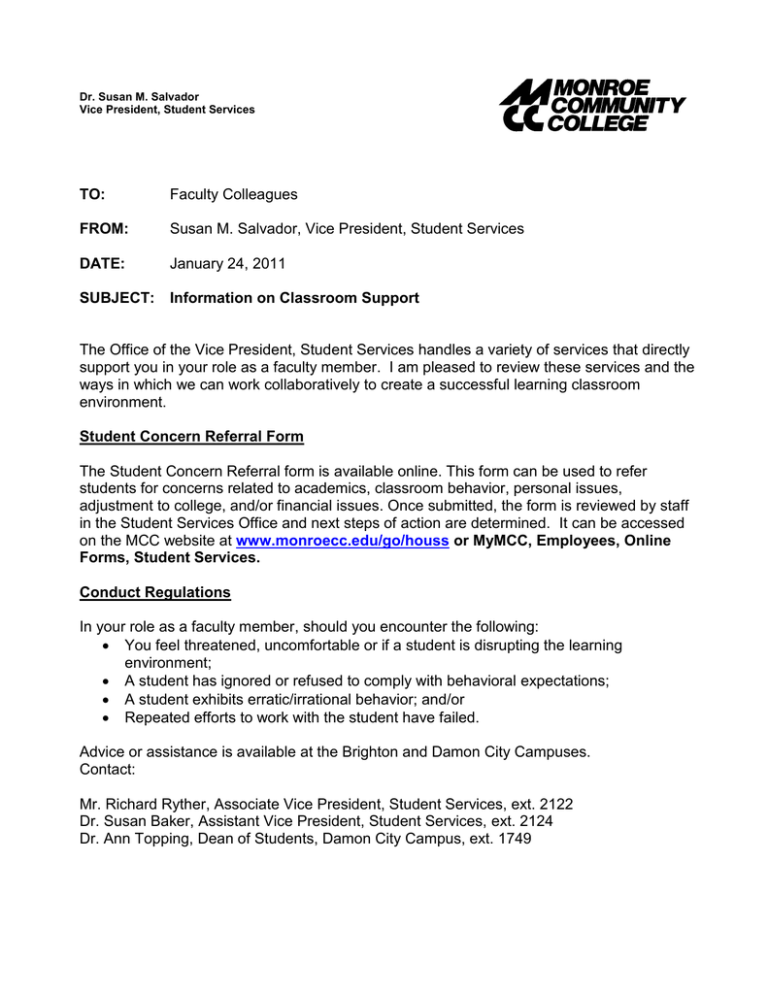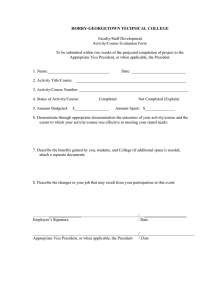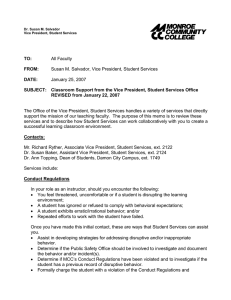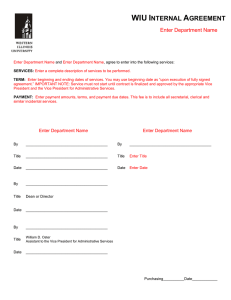
Dr. Susan M. Salvador
Vice President, Student Services
TO:
Faculty Colleagues
FROM:
Susan M. Salvador, Vice President, Student Services
DATE:
January 24, 2011
SUBJECT:
Information on Classroom Support
The Office of the Vice President, Student Services handles a variety of services that directly
support you in your role as a faculty member. I am pleased to review these services and the
ways in which we can work collaboratively to create a successful learning classroom
environment.
Student Concern Referral Form
The Student Concern Referral form is available online. This form can be used to refer
students for concerns related to academics, classroom behavior, personal issues,
adjustment to college, and/or financial issues. Once submitted, the form is reviewed by staff
in the Student Services Office and next steps of action are determined. It can be accessed
on the MCC website at www.monroecc.edu/go/houss or MyMCC, Employees, Online
Forms, Student Services.
Conduct Regulations
In your role as a faculty member, should you encounter the following:
You feel threatened, uncomfortable or if a student is disrupting the learning
environment;
A student has ignored or refused to comply with behavioral expectations;
A student exhibits erratic/irrational behavior; and/or
Repeated efforts to work with the student have failed.
Advice or assistance is available at the Brighton and Damon City Campuses.
Contact:
Mr. Richard Ryther, Associate Vice President, Student Services, ext. 2122
Dr. Susan Baker, Assistant Vice President, Student Services, ext. 2124
Dr. Ann Topping, Dean of Students, Damon City Campus, ext. 1749
Classroom Support from the Vice President, Student Services
Page 2 of 5
Once you have made this initial contact, Student Services can assist you by:
Developing strategies for addressing disruptive and/or inappropriate behavior.
Determining if the Public Safety Office should be involved to investigate and document
the behavior and/or incident(s).
Determining if MCC’s Conduct Regulations have been violated and to investigate if
the student has a previous record of disruptive behavior.
Formally charging the student with a violation of the Conduct Regulations and
determining an appropriate sanction (reprimand, censure, probation, suspension,
expulsion).
Removing the student from a particular class, moving the student to another section
(only with the approval of all faculty involved and the Department Chair) or separating
disruptive students by assigning specific seats, as appropriate.
Collaborating with faculty to jointly decide on the action to be taken and insuring that
faculty are in control of the decisions that affect their classrooms.
Promoting and maintaining an atmosphere of civility on campus.
Attendance
You may assign a grade of “W” for individual courses due to unsatisfactory attendance.
We ask that you report students for excessive absence when such absence is adversely
affecting the students’ academic achievement in a particular course (not necessarily
failing work). Each student will be informed in writing of the recommendation, and if there
are extenuating circumstances, the student is advised to continue to attend the class and
to consult with the faculty member immediately. If further discussion is needed after
consulting with you, the student is advised to contact the Student Services Office. The
student will be referred to the grievance procedures under the Rights and Freedom of
Students section of the Catalog and Student Handbook. This faculty-initiated withdrawal
must be requested no later than 15 class days before the final class of the semester (or a
proportional amount of time for courses less than 15 weeks in length).
Academic Honesty
If you have evidence that a student is guilty of cheating or plagiarism, you may initiate the
appropriate disciplinary action. However, no penalty shall be imposed until after the
student has been informed of the charge of academic dishonesty and of the evidence
upon which it is based, and been given the opportunity to present whatever statement or
evidence the student desires in his/her defense.
If the student is found guilty, you shall assess a penalty within the course consistent with
the magnitude of the transgression. Such penalty, if it affects the student’s grade, shall
be reported in writing to the appropriate department chair and to the Vice President,
Student Services.
Classroom Support from the Vice President, Student Services
Page 3 of 5
The Vice President maintains a database of all reported cases of academic dishonesty,
and the Vice President may initiate further disciplinary action in any case of repeated
infractions or in cases of complicity on a large scale. Such further disciplinary action may
result in probation, suspension or expulsion from the College.
Should the student dispute the facts upon which you determined the penalty, or object to
the severity of the penalty, a written appeal may be submitted to the Vice President,
Student Services requesting a hearing before an Appeal Board. The Appeal Board shall
review the facts of the case, hear testimony, consider the disciplinary action taken and
render a decision to uphold, reject or modify such action. The burden of proof of the
charges rests with you.
Throughout this appeal process the Student Services Office serves as an impartial
mediator with the task of organizing the Appeal Board and insuring that the rights of you
and the student are protected and that “due process” occurs. During the appeal process,
the student is allowed to continue to attend class pending the outcome of the appeal
hearing.
Academic Grievance
To protect the rights and freedoms of students and faculty members, Monroe Community
College subscribes to the Joint Statement on Rights and Freedoms of Students (located
in the MCC Catalog and Student Handbook). Procedures are in place to provide for the
orderly, fair and prompt resolution of perceived student academic grievances. These
procedures are established to insure the due process and the equitable treatment and
protection of all parties involved.
The term academic grievance refers to a complaint by the student against a faculty
member of the College. The grievance may be filed on the grounds that:
The rights and freedoms of the student in the classroom as described in the Joint
Statement have been violated, or
Any of the academic regulations of the College have been violated, misinterpreted or
inequitably applied.
If the student and faculty member and/or department chairperson have met and are not
able to resolve the grievance, the formal procedure is initiated. A College Academic
Grievance Advisor is assigned by either Academic Services or Student Services Office to
meet with the student to discuss the issue.
The Grievance Advisor counsels the student and assists the student through the various
steps of the formal procedures (described in detail the College Catalog and Student
Handbook).
Classroom Support from the Vice President, Student Services
Page 4 of 5
The adjudication of the grievance begins with the Division Dean, can proceed to a
College Academic Grievance Hearing Committee and ultimately will be reviewed and
finalized by the Vice President, Academic Services.
Sexual Harassment
Sexual harassment is any threatening, demeaning or offensive conduct or situation that
unreasonably interferes with a person’s pursuits and is based on the sex of that person.
Sexual harassment is any conduct or situation that, on the basis of sex, makes it more
difficult for a reasonable person to do a job or receive his or her education. Sexual
harassment is a form of discrimination based on sex because the harassment treats a
member, or members, of one sex differently from members of the other sex or engages in
conduct that is based on the difference in sex.
Sexual harassment is illegal and it applies to all employees and students at all times and
places in any connection with the institution. If, as a faculty member, you are a victim of
sexual harassment, or you have knowledge of a student or employee who has been a
victim of sexual harassment, you should contact the Office for Student Services at the
Brighton Campus or the Student Services Center at the Damon City Campus.
Incidents of sexual harassment that involve students will be investigated confidentially by
the sexual harassment officer and the Vice President, Student Services. The Vice
President, Student Services has the final and ultimate determination of discipline.
Incidents that involve only employees will be investigated by the Human Resources
Office. Incidents involving students and staff will be investigated jointly by the Student
Services Office and the Human Resources Office.
I wish you much success. Please feel free to contact our office (Ext. 2122) if you have
any questions. Thank you.
c: Kimberley Collins, Interim Vice President, Academic Services
SS/dq
Classroom Support from the Vice President, Student Services
Page 5 of 5




